2025-05-23 11:41:00
Richard A Carter
University of York, Campus East, United Kingdom
United Kingdom
NOAA-19
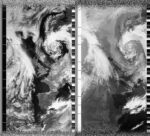
2025-05-23 11:36:20
Richard A Carter
University of York, Campus East, United Kingdom
United Kingdom
NOAA-18
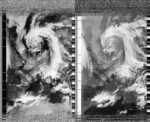
2025-05-21 12:06:00
Richard A Carter
University of York, Campus East,
NOAA-19
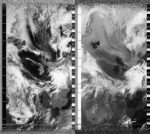
2025-05-21 12:02:20
Richard A Carter
University of York, Campus East, United Kingdom
United Kingdom
NOAA-18
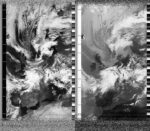
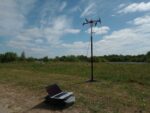
2025-05-21 10:27:54
Richard A Carter
University of York, Campus East, United Kingdom
United Kingdom
NOAA-19
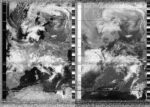

Alongside these soundings I have been conducting another small project of my own - Nephoscope. Named after 19th century instruments for measuring the movements of clouds, my digital equivalent analyses these movements using the camera in my phone, using the data to then generate a form of poetry over the video feed. I like this idea of these two electronic instruments, satellite and nephoscope, working together to map and articulate the atmosphere along two different registers, and at two very different scales.
2025-05-16 13:10:08
Richard A Carter
University of York, Campus East, United Kingdom
United Kingdom
NOAA-18
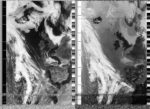
2025-05-16 11:28:52
Richard A Carter
University of York, Campus East, United Kingdom
United Kingdom
NOAA-19
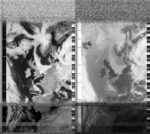
2025-05-15 11:48:00
Richard A Carter
University of York, Campus East, United Kingdom
United Kingdom
NOAA-18

A hurried, last minute sounding, and an odd sense of sadness, given the impending decommissioning of the analogue NOAA satellites. Cool and dry conditions, amidst what is likely to be the driest Spring on record in the UK.
2025-05-14 11:58:41
Richard A Carter
University of York, Campus East, United Kingdom
United Kingdom
NOAA-19
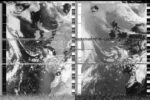

It is always pleasing to watch the signals of two NOAA satellites together, on the waterfall.
2025-05-08 13:09:40
Richard A Carter
University of York, Campus East, United Kingdom
United Kingdom
NOAA-18
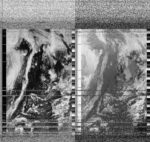
Last week was the hottest May day on record in the UK, today is decidedly cooler and greyer. A reminder that Spring is always an unstable threshold, like any season.
2025-05-01 13:02:16
Richard A Carter
University of York, Campus East, United Kingdom
United Kingdom
NOAA-18
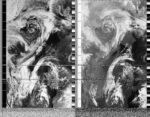
This image was gathered as part of a class workshop I ran today, as a simple way of bearing out the radio networks that underpin much of our contemporary environment.
2025-05-01 11:21:51
Richard A Carter
University of York, Campus East, United Kingdom
United Kingdom
NOAA-19
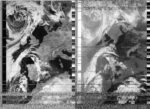
This image was gathered as part of a class workshop I ran today, as a simple way of bearing out the radio networks that underpin much of our contemporary environment.
2025-04-25 10:55:27
Richard A Carter
University of York, Campus East, United Kingdom
United Kingdom
NOAA-19
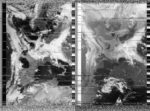
Calm, cool conditions were conducive to a clear and crisp recording, marred only by my perennial foe during recent efforts - software glitches, cutting out the audio! I had a chance to reflect at a conference yesterday on the nature of these sensory undertakings, the registers and durations that they speak to. Glitches themselves manifest across multiple durations, and begin to inscribe their marks long before they become apparent on recorded media. The deep, granular hardware incompatibilities that will forever prevent this computer from generating a clear image were established several years ago, when it was first built, and will now be registered in this archive for as long as it is sustained. There's something pleasing about this - a sense of material traces across time that the usual quest for the perfect image (the perfect sensory recording) would otherwise strive to eliminate. There are long histories of Western onto-epistemic-political imperatives at work here, and these are now manifest in the technologies and techniques that delivered the signal processing behind our digital world - along with its surrounding marking rhetoric of perfect reproduction, and seamless, immaterial operation. The computing of angels.
All this observed - I am presently dredging up an unusably 'glitched' computer that, nevertheless, once gave vastly better recordings than the more modern machine used here. I hope it might deliver a clearer image for the next pass, in 30 minutes time!
2025-04-17 10:54:19
Richard A Carter
University of York, Campus East, United Kingdom
United Kingdom
NOAA-15
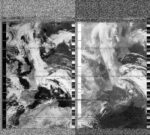
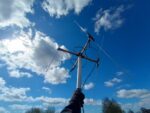
Cable problems mean even the slightest breeze generates noise in the image - but this does result in the rather pleasing fact that the weather itself affects the image generated. You can see when significant breezes come in as striations over the image.
2025-04-16 11:09:39
Richard A Carter
University of York, Campus East, United Kingdom
United Kingdom
NOAA-19
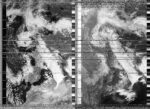
2025-04-15 19:35:37
Richard A Carter
York, United Kingdom
United Kingdom
NOAA-15
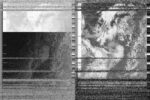
A very noisy sounding, but fortunately free of the audio cut-outs that have beset many recent efforts. A chance also to see the image 'click' across the night time threshold.
2025-04-11 12:14:47
Richard A Carter
University of York, Campus East, United Kingdom
United Kingdom
NOAA-18
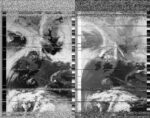
Today's sounding was mainly a test run, with noise and audio cutouts (the dark striations) proving a persistent issue - although the image was better than expected. Suspect these artefacts are a quirk of the new laptop I have been using, as previous devices (now sadly defunct) were fine. Once again, a reminder of the intricate chain of systems that all need to align in order for a recording to be gathered and processed.
2025-03-23 10:08:54
Richard A Carter
University of York, Campus East, United Kingdom
United Kingdom
NOAA-19
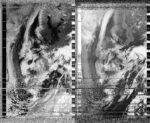
Equipment troubles finally subsided for today's pass, resulting in a pleasingly expansive view of Europe and parts of North Africa. One interesting aside is that the wind was such that it blew through small gaps in the antenna, making distinctly musical notes in the process - can imagine a speculative art project in which the antenna is turned into a sort of instrument, working alongside the distinct notes of the NOAA transmission coming in. It would be quite the composition!
2025-03-21 12:25:30
Richard A Carter
University of York, Campus East, United Kingdom
United Kingdom
NOAA-18
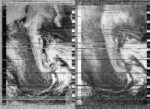
Software problems caused frequent glitches in the audio stream, resulting in this rather "striated" sounding, despite an otherwise excellent signal. A reminder, if there ever was, of the fragile chain of material structures and processes that enable these activities - and of how this fragility emerges from their status as constantly performing 'agents' in the world, rather than the typical image of technology as always fully tamed, always fully obedient to human imperatives.
2025-02-20 11:54:48
Richard A Carter
University of York, Campus East, United Kingdom
United Kingdom
NOAA-18

First notably warm day of the year, unusually so in February, at 15C. Blustery. Malfunctioning equipment cut off both the start and end of the transmission recording - which also survived a complete computer crash.
2025-01-24 12:37:55
Richard A Carter
York, United Kingdom
United Kingdom
NOAA-18
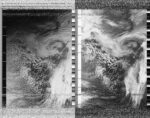
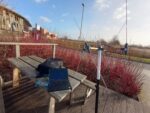

This weather sounding took place during Storm Éowyn. Even when undertaken within the ostensibly sheltered confines of York University campus, the roaring winds were more than sufficient to knock over and scatter the ground station equipment, even as the sounding was taken place! The double cross antenna fell to pieces and had to be repaired and held in position against the wind as NOAA-18 passed overhead - surprisingly, this did not appear to impact the recording.
Undoubtedly, the chief source of local concern around the climate crises is in its potential to generate flooding from the nearby rivers Ouse and Fosse.